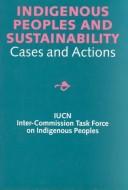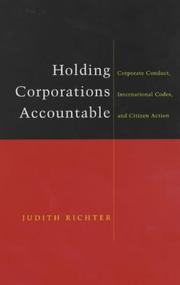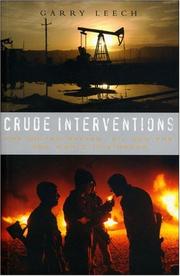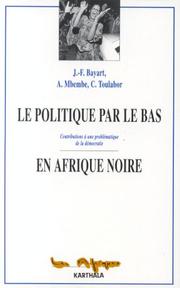| Listing 1 - 6 of 6 |
Sort by
|

ISBN: 9057270110 9789057270116 Year: 1997 Publisher: Utrecht International Books
Abstract | Keywords | Export | Availability | Bookmark
 Loading...
Loading...Choose an application
- Reference Manager
- EndNote
- RefWorks (Direct export to RefWorks)

ISBN: 1856499839 1856499847 Year: 2001 Publisher: London Zed Books
Abstract | Keywords | Export | Availability | Bookmark
 Loading...
Loading...Choose an application
- Reference Manager
- EndNote
- RefWorks (Direct export to RefWorks)
Political philosophy. Social philosophy --- Professional ethics. Deontology --- Baby foods --- Business ethics. --- International business enterprises --- Social responsibility of business. --- Marketing --- Management --- Citizen participation. --- Moral and ethical aspects. --- MVO (maatschappelijk verantwoord ondernemen)
Book
ISBN: 9780197530351 0197530354 Year: 2021 Publisher: New York, N.Y. Oxford University Press
Abstract | Keywords | Export | Availability | Bookmark
 Loading...
Loading...Choose an application
- Reference Manager
- EndNote
- RefWorks (Direct export to RefWorks)
"The word "peacebuilding" evokes a story we've all heard over and over: violence breaks out, foreign nations are scandalized, peacekeepers and million-dollar donors come rushing in, warring parties sign a peace agreement and, sadly, within months the situation is back to where it started--sometimes worse. But what strategies have worked to build lasting peace in conflict zones, particularly for ordinary citizens on the ground? And why should other ordinary citizens, thousands of miles away, care? In The Frontlines of Peace, Severine Autesserre, award-winning researcher and peacebuilder, examines the well-intentioned but inherently flawed peace industry. With examples drawn from across the globe, she reveals that peace can grow in the most unlikely circumstances. Contrary to what most politicians preach, building peace doesn't require billions in aid or massive international interventions. Real, lasting peace requires giving power to local citizens. The Frontlines of Peace tells the stories of the ordinary yet extraordinary individuals and organizations that are confronting violence in their communities effectively. One thing is clear: successful examples of peacebuilding around the world, in countries at war or at peace, have involved innovative grassroots initiatives led by local people, at times supported by foreigners, often employing methods shunned by the international elite. By narrating success stories of this kind, Autesserre shows the radical changes we must take in our approach if we hope to build lasting peace around us--whether we live in Congo, the United States, or elsewhere"--
Peace --- Peace-building. --- Peaceful change (International relations) --- Citizen participation. --- paix --- violence --- politique internationale --- BPB2107 --- pokój --- Friede --- pace --- peace --- taika --- miers --- mier --- mír --- mir --- rauha --- fred --- rahu --- paqe --- мир --- paċi --- vrede --- paz --- béke --- ειρήνη --- international affairs --- medzinárodná politika --- rahvusvaheline poliitika --- internationale politiek --- politikë ndërkombëtare --- международна политика --- política internacional --- međunarodni poslovi --- internationell politik --- mednarodna politika --- међународна политика --- affarijiet internazzjonali --- international politik --- διεθνής πολιτική --- nemzetközi ügyek --- меѓународна политика --- kansainvälinen politiikka --- internationale Politik --- politică internațională --- starptautiski jautājumi --- mezinárodní politika --- polityka międzynarodowa --- tarptautinė politika --- politica internazionale --- medzinárodné záležitosti --- international politics --- starptautiskā politika --- asuntos internacionales --- világpolitika --- assuntos internacionais --- mezinárodní záležitosti --- affaires internationales --- internationale Angelegenheiten --- internationale zaken --- politici internaționale --- nemzetközi politika --- affari internazionali --- internacionální záležitosti --- internacionální politika --- tarptautiniai reikalai --- διεθνή θέματα --- Weltpolitik --- geweld --- βία --- vardarbība --- violență --- насилие --- násilie --- násilí --- väkivalta --- smurtas --- vjolenza --- violenza --- erőszak --- violência --- насилство --- przemoc --- vold --- nasilje --- violencia --- Gewalt --- насиље --- vägivald --- våld --- dhunë --- smurtavimas --- agresivita --- физичко насилство --- агресивност --- violenza fisica --- violenza morale --- Peace-building --- Citizen participation --- gnóthaí idirnáisiúnta --- foréigean --- International relations. Foreign policy --- Polemology --- síocháin --- Peace - Citizen participation

ISBN: 9781848134454 9781848134461 9781848134478 1848134460 1848134479 9781848131255 1848131259 1282903349 9781282903340 9786612903342 6612903341 1848134452 9781848131259 1350221414 9781848136366 1848136366 1281259128 9781281259127 1350219444 9786611259129 9781842776285 1842776282 9781842776292 1842776290 9832535840 9781869140922 1869140923 Year: 2006 Publisher: London, England : [London, England] : Zed Books, Bloomsbury Publishing,
Abstract | Keywords | Export | Availability | Bookmark
 Loading...
Loading...Choose an application
- Reference Manager
- EndNote
- RefWorks (Direct export to RefWorks)
"Crude interventions examines the military and economic policies of the Bush administration in oil-rich regions of the world. More precisely, it examines the socio-economic and human rights consequences of these policies, as well as those of recent US administrations and multinational energy companies, for the peoples of oil-producing nations in the global South. With only 4 per cent of the world's population, the United States consumes 25 per cent of global energy production. This thirst for energy has played a significant role in determining US foreign policy in recent decades. The desire to secure access to reliable supplies of oil has played an even more prominent role in determining the foreign policy of the government of George W. Bush than of previous administrations." "By focusing on the US role in Iraq, Central Asia, West Africa, Colombia and Venezuela, Crude Interventions makes evident the connections between US energy interests, the war on terror, globalization, human rights abuses and other social injustices endured by those peoples of the South cursed with an abundance of the world's most sought after resource."--Jacket.
Political sociology --- Developing countries --- Political participation --- Democracy --- Democracy -- Case studies. --- Democracy. --- Political participation -- Case studies. --- Political participation. --- Government - General --- Law, Politics & Government --- Political Institutions & Public Administration - General --- Citizen participation --- Community action --- Community involvement --- Community participation --- Involvement, Community --- Mass political behavior --- Participation, Citizen --- Participation, Community --- Participation, Political --- Political activity --- Political behavior --- Political rights --- Social participation --- Political activists --- Politics, Practical --- Political participation - Case studies --- Democracy - Case studies --- Petroleum industry and trade --- Petroleum & oil industries --- Political aspects --- United States --- Foreign economic relations. --- Foreign relations --- Political activism --- Politics & government --- Civil rights & citizenship --- Foreign economic relations --- International relations. Foreign policy --- natuurlijke grondstoffen --- United States of America

ISBN: 2865372901 9782865372904 Year: 1992 Publisher: Paris Karthala
Abstract | Keywords | Export | Availability | Bookmark
 Loading...
Loading...Choose an application
- Reference Manager
- EndNote
- RefWorks (Direct export to RefWorks)
Political sociology --- Sub-Saharan Africa --- Representative government and representation --- Gouvernement representatif --- Africa --- Afrique --- Politics and government --- Politique et gouvernement --- Political participation --- 321 <6> --- -Political participation --- -#SBIB:39A73 --- #SBIB:39A11 --- #SBIB:328H41 --- 321.7 <6=96> --- Citizen participation --- Community action --- Community involvement --- Community participation --- Involvement, Community --- Mass political behavior --- Participation, Citizen --- Participation, Community --- Participation, Political --- Political activity --- Political behavior --- Political rights --- Social participation --- Political activists --- Politics, Practical --- Politieke organisatie. Staten als politieke machten. Regeringsvormen--Afrika --- Etnografie: Afrika --- Antropologie : socio-politieke structuren en relaties --- Instellingen en beleid: Afrika: comparatief / diverse landen --- 321 <6> Politieke organisatie. Staten als politieke machten. Regeringsvormen--Afrika --- #SBIB:39A73 --- Political participation - Africa, Sub-Saharan --- Political participation - Togo --- Political participation - Cameroon --- VIE POLITIQUE --- FORCES POLITIQUES --- AUTRES --- ROLE DES PETITS ET DES SANS IMPORTANCE --- AFRIQUE NOIRE --- ORGANISATION DU POUVOIR --- AFRIQUE
Book
ISBN: 9780521191005 9780521156011 0521156017 0521191009 9780511761034 9780511932533 0511932537 0511761031 9780511927355 0511927355 9780511924811 051192481X 110720402X 051185238X 1282908154 9786612908156 0511931190 0511929854 Year: 2010 Volume: 115 Publisher: Cambridge Cambridge University Press
Abstract | Keywords | Export | Availability | Bookmark
 Loading...
Loading...Choose an application
- Reference Manager
- EndNote
- RefWorks (Direct export to RefWorks)
The Trouble with the Congo suggests a new explanation for international peacebuilding failures in civil wars. Drawing from more than 330 interviews and a year and a half of field research, it develops a case study of the international intervention during the Democratic Republic of the Congo's unsuccessful transition from war to peace and democracy (2003-6). Grassroots rivalries over land, resources, and political power motivated widespread violence. However, a dominant peacebuilding culture shaped the intervention strategy in a way that precluded action on local conflicts, ultimately dooming the international efforts to end the deadliest conflict since World War II. Most international actors interpreted continued fighting as the consequence of national and regional tensions alone. UN staff and diplomats viewed intervention at the macro levels as their only legitimate responsibility. The dominant culture constructed local peacebuilding as such an unimportant, unfamiliar, and unmanageable task that neither shocking events nor resistance from select individuals could convince international actors to reevaluate their understanding of violence and intervention.
Peaceful settlement of international disputes --- Polemology --- anno 1990-1999 --- anno 2000-2009 --- Congo --- Peace-building --- Community development --- Conflict management --- Internal security --- Violence --- Ethnic conflict --- Consolidation de la paix --- Développement communautaire --- Gestion des conflits --- Sûreté de l'Etat --- Conflits ethniques --- Congo (Democratic Republic) --- Congo (République démocratique) --- History --- Histoire --- INTERNAL SECURITY -- 930.3 --- VIOLENCE -- 930.3 --- ETHNIC CONFLICT -- 930.3 --- CONGO -- 327.1 --- PEACEBUILDING -- 327.1 --- COMMUNITY DEVELOPMENT -- 327.1 --- CONFLICT MANAGEMENT -- 327.1 --- INTERNAL SECURITY -- 327.1 --- VIOLENCE -- 327.1 --- COMMUNITY MANAGEMENT -- 930.3 --- ETHNIC CONFLICT -- 327.1 --- #SBIB:327.6H00 --- #SBIB:328H412 --- Internationale en diplomatieke relaties: algemeen --- Instellingen en beleid: Zaïre / Congo --- Développement communautaire --- Sûreté de l'Etat --- Congo (République démocratique) --- Violent behavior --- Social psychology --- Building peace --- Peacebuilding --- Peace --- Peacekeeping forces --- Security, Internal --- Insurgency --- Subversive activities --- Conflict, Ethnic --- Ethnic violence --- Inter-ethnic conflict --- Interethnic conflict --- Ethnic relations --- Social conflict --- Conflict control --- Conflict resolution --- Dispute settlement --- Management of conflict --- Managing conflict --- Management --- Negotiation --- Problem solving --- Crisis management --- Regional development --- Economic assistance, Domestic --- Social planning --- Citizen participation --- Government policy --- Social Sciences --- Political Science --- Peace-building - Congo (Democratic Republic) --- Community development - Congo (Democratic Republic) --- Conflict management - Congo (Democratic Republic) --- Internal security - Congo (Democratic Republic) --- Violence - Congo (Democratic Republic) --- Ethnic conflict - Congo (Democratic Republic) --- Congo (Democratic Republic) - History - 1997 --- -Peace-building --- -Community development
| Listing 1 - 6 of 6 |
Sort by
|

 Search
Search Feedback
Feedback About UniCat
About UniCat  Help
Help News
News